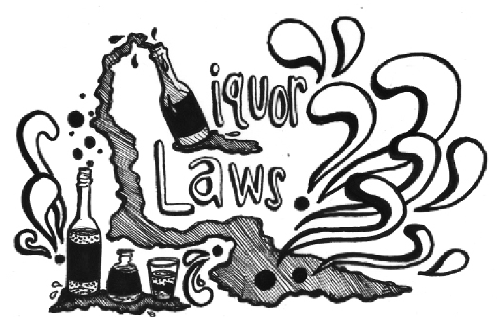The staff editorial is the majority opinion of The Murray State News Editorial Board.

Not being allowed to buy alcohol on Sunday, bars closing early on weekends and not being able to buy wine at the grocery store are just a few of the requirements outlined in Murray’s liquor laws.
Our liquor laws make it feel like we’re playing a game of chess because we have to strategize when we are going to buy alcohol instead of just trying to enjoy our “wet” status. We were excited to exercise our new freedoms when the vote passed to legalize packaged liquor sales in 2012, but some old laws still get in the way.
Not only does is this an annoyance, but it hinders local businesses. Bars have to push out waves of customers as early as 1 a.m. Bar-goers are forced out the door before it’s technically Sunday. Popular local restaurants like Nick’s Sports Pub and Mr. J’s Grill and Pub close entirely on Sunday, losing a day’s worth of revenue because of these conditions.
We joined a Kentucky minority when we legalized packaged liquor sales. There are currently 32 wet counties in the state, 39 dry counties and 49 moist counties. Unfortunately, this means the influence of dry counties still affects how we regulate liquor sales. For example, if a county decides to vote wet, a precinct in the city can conduct a re-vote to return to dry status. If a county is voted dry, there is no possibility of a re-vote to go to wet status.
It seems that our laws are tailored to manipulate counties into going dry. Counties that vote wet are subjected to a confusing array of stipulation laws that leave us wondering what we can and can’t do.
It’s city law that restaurants who serve alcohol must have 70 percent of their revenue come from food sales and only 30 percent of their revenue come from liquor sales. Operating this way seems unreasonable because of the college community that enjoys drinking at bars.
The stiff penalties that restaurants face if they don’t comply is unfair, seeing as customers choose what they want to order.
To make this situation more of a headache, there isn’t a revised list of Murray’s liquor laws available online for people who don’t understand them. The city’s website has not been updated since the vote passed in 2012 and the only information available regarding liquor is a business application for a liquor license. We hear what we can and can’t do through word of mouth, but the statutes are hard to find.
Piecemeal liquor laws aren’t just a problem in Murray. Kentucky’s statewide liquor laws are largely in conflict with each other. Former Kentucky Supreme Court Justice Charles Leibson described Kentucky’s liquor laws as “a maze of obscure statutory language,” whose meanings were “anybody’s guess.” If politicians can’t decipher our laws, then how can we be expected to?
The politics behind our laws should be put aside so we can make sure our local businesses have a better chance to succeed. The question of whether or not selling packaged liquor was “the right thing to do,” has already been addressed. It was answered when we decided it should be legal. To dilute the process with unorganized jargon is annoying, counterproductive and worth reconsideration.
We can no longer ignore that liquor is a source of city revenue. According to the Alcoholic Beverage Control quarterly report, 46 Murray establishments yielded $301,824 in revenue for the city from Oct. 1 through Dec. 31. This is money we shouldn’t push away and it has potential to grow.
Whether the laws were created with moral or religious intentions is uncertain, but we have to consider changing them if we want to see Murray continue to attract business and create revenue.
During a time of heavy commercialization and growth, Murray should revisit its standing liquor laws. If that’s out of the question for now, let’s at least make our laws transparent.